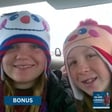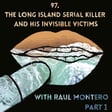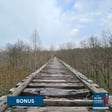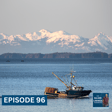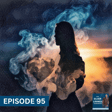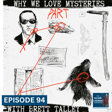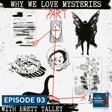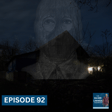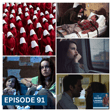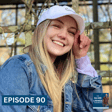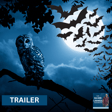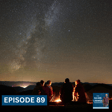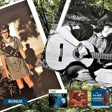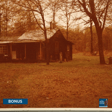Become a Creator today!Start creating today - Share your story with the world!
Start for free
00:00:00
00:00:01

88. Storm Chaser with Jim Reed
We are joined by Jim Reed, a photographer and documentarian who was been chasing storms for almost four decades. Jim discusses chasing hurricanes, tornados and other anomalous weather across the world, the realities versus the depictions of storm chasing, the psychological and emotional cost of the work and why, for him, it's all about chasing beauty.
Check out the Silver Linings Handbook website at:
https://silverliningshandbook.com/
Check out our Patreon to support the show at:
https://www.patreon.com/thesilverliningshandbook
Visit the Silver Linings Handbook store to support the podcast at:
https://www.bonfire.com/store/the-silver-linings-handbook-podcast-store/
Transcript
Jim Reed's Early Passion for Storm Chasing
00:00:00
Speaker
ah helping and and and my love for beauty. see that's but In my early days of storm chasing, I found it interesting that Some people would get very upset that the tornado wasn't going to form.
Finding Beauty in Nature and Human Connection
00:00:15
Speaker
In some cases, the storm wasn't going to form because it's what they call a bust. The forecast just didn't verify. I'd be overlooking at the sunflowers, going like, wow, what a beautiful field of sunflowers. So i was always I was much easier to please. I could find something out there chasing beauty. And you said something while ago. I don't want to let go. Talking about the connection with an individual.
00:00:39
Speaker
and help. Let me mention this too. So here I am you know a couple years into being here in Caledonia and I meet a mother and she says my daughter's terrified of storms. She just won't come out of a room whenever they're forecast. And I said, well, that's usually treatable and and identifiable. you know ah Have her talk to me sometime? Well, a year passes and and I meet her daughter.
Jim Reed: Accomplished Storm Photographer
00:01:09
Speaker
And the first thing I noticed was the mom was kind of like, oh, she, she's scared to death of storms. And she says the same thing she did to me the year before. That's Jim Reed, who's recognized as one of the world's most accomplished extreme weather photographers. This is the Silver Linings Handbook podcast. I'm Jason Blair.
00:01:44
Speaker
Jim Breed was born in Albany, Georgia, raised in Springfield, Illinois, and was 16 years old when he photographed his first extreme weather event. Jim has had a career-long attraction to the work of documentary and journalism and wanted to become a writer by the time he obtained his bachelor's degree in creative arts from the University of Southern California. But photography kept pulling him back in. Jim has spent almost two decades documenting almost every type of meteorological phenomena, from floods to electrical storms to tornadoes, blizzards and hurricanes. A veteran, full-time storm chaser,
00:02:27
Speaker
Jim is considered one of the world's most accomplished extreme weather photographers. His work has appeared on Good Morning America, The Today Show, National Geographic, and numerous other publications and television programs. Among those places, his work has been published in The New York Times, Scientific American, Popular Science, and The Guardian.
Documenting Climate Change and Its Impacts
00:02:49
Speaker
Jim brings his skills as a writer, journalist, and documentarian to his photography. In 1991, Jim began a 30-year project to document climate change and its impact on the United States, examining extreme weather, including tornadoes, blizzards, floods, droughts, and nearly 20 hurricanes that are believed to be the result of these changes.
00:03:13
Speaker
Among the events the gem covered was Hurricane Katrina, the August 2005 devastating and deadly Category 5 Atlantic Hurricane that led to 1392 fatalities and damages estimated to be at $190 billion. dollars As measured by barometric pressure, Katrina was the fourth most intense Atlantic hurricane to make landfall in the contiguous United States. His book, Hurricane Katrina, Through the Eyes of Storm Chasers, documents the devastation in Florida, Gulfport, Mississippi, and New Orleans.
Life in Caledonia and Personal Reflections
00:03:52
Speaker
He is also the author of a well-regarded book of photography called Storm Chaser, A Photographer's Journey. American Photo Magazine calls Jim, quote, more than a great storm chaser who risks his life to create iconic images of extreme weather and goes on to say that he's a, quote, heartfelt environmentalist whose real mission is to encourage us all to adopt a more helpful and prudent lifestyle. But also, Jim has a deep understanding of not just the beauty of weather, but the trauma that can be caused by these events. Jim now lives in Caledonia, Minnesota with his golden retriever, Sawyer. Today, we're going to discuss storm chasing, the reasons he risks his safety to create these images, the art, the science, and the craft of his photography, what Jim hopes to document about the world through his photography,
00:04:48
Speaker
and how to make the world a better place through love, healing, and beauty.
00:05:07
Speaker
So, Jim, I just wanted to thank you for joining. You know, I, for me, you know, this to me, this is just the ah the work you do is just a fascinating space for me. you know I've always been really interested in the world of psychology and how people think and what gets them moving. And I've always been fascinated by people who really seek new experiences, thrill, stimulation. And so ah a couple months ago, one of my listeners, Sophie, who's an artist and a photographer herself, and also very interested in anomalous things, suggested the idea of talking to
00:05:48
Speaker
a storm chaser to a photographer who is a storm chaser where you're... And you know for me, I think it's as somebody who's also a former journalist, it's just a fascinating, fascinating world and you have this opportunity even though people may notice the pictures the most, you have this opportunity to tell stories and learn stories doing the work that you do that I find really fascinating. yeah Absolutely, Jason, and I appreciate what you're saying. yeah i am I'm just sort of like curious and thinking about you know sort of ah what sort of kind of people gravitate to the work you do and what do you think caused you to gravitate to it? Because you know therere there are people who are very far on the extremes when it comes to taking risks. and you know Many people who are even more so sort of i guess cautious,
00:06:44
Speaker
are really curious about what motivates somebody to do something like chase storms. Well that's a great question. I try to storm chase and do my photography as safely as possible. um I had really good climatologists and researchers, tornado researchers and some scientists that ah you know took me under their wing and and taught me a lot of but what I needed to know. I liken storm chasing to mountain climbing. Not everybody wants to do it, but there are quite a few people who do want to and consider it exciting and ah and a risk.
00:07:22
Speaker
and but Then you look at who's climbing. ah Is it somebody that has taken a class that has researched the gear? ah Is it somebody who has hired a professional with experience to take them on the mountain climb? And are they in good health, the person that's doing this? And then yeah what do they want to do along the way? Are they just wanting to camp and and be quiet? Are they wanting to camp and be ah with others? Are they wanting to take pictures? Are they wanting to you know accomplish some sort of goal, like make it to the peak, ah to the summit? and you know Then there might be people that think, well, I can do that, and I don't really need any help. I don't need any training.
00:08:09
Speaker
and and the likelihood of them getting hurt goes way up because they haven't researched the subject, they haven't researched ah the gear, they haven't researched ah you know what they and what level of health they need to be. Because I think that sometimes people who find risk-taking appealing, some do it with ah respect for health and others kind of do it more impulsively. And and I think there's a... you know
00:08:40
Speaker
If it's a bold enough risk or a high enough risk, you know your adrenaline is going to get going. and When your adrenaline goes, you tend to forget everything else that's going on around you. and and and If you're somebody who is looking for a risk to ah emotionally you know quiet themselves, and that might happen, but I don't know if that's the best reason. Yeah, you know, this reminds me a lot about like when I was trying to decide like do I want to go skydiving because I'm a bit of a risk taker myself. And I was talking to a friend about it and she was saying to me, like, how can you go do this? It seems so scary. And I said, well, certainly it's a risk and certainly it's like thrill seeking, but it's it's because I that underneath sort of like my risk taking is that I really i like I love calculating things. I love calculated breasts.
00:09:35
Speaker
So I'm like, well, an engineer created this, I have this great trainer, this was built for this, there's this backup in here, so jump. right
00:09:46
Speaker
um ah That makes sense to me because one of the things that got me curious about the weather in the first place was I had really good science teachers in high school. And they really encouraged us to ask ah questions about anything we wanted. And and we we were just trying to figure out what makes the world spin and why did tornadoes form and you know. So there's there's for me, and keep in mind, i'm i' I don't chase as much as I used to. I pick and choose my my events much more ah carefully or collectively. Yes, exactly. ah I began chasing probably right around 80,
00:10:25
Speaker
nine ninety But I didn't really get into it seriously until 1992, 1993. And that's when I started. ah you know I did it initially because it just was a fascinating subject to me. And and like your skydiving, it involves ah you know gear and and understanding physics, understanding science, ah hooking up with people, hopefully whoever's flying you up for you to jump out of a perfectly good place. Yeah. is's a good it's a good pilot that is Actually, it's funny you say that. say One of my friends I remember first time I went, came back and said, why would anyone jump out of a perfectly good plane? mike That's a good question. i will somebody yeah Some days I just want to step into a time machine and go back. you know I went to ah the University of Southern California where I got my degree and a Bachelor of Fine Arts degree with an emphasis in cinematography and drama.
00:11:24
Speaker
And if I could go back today, I think I would really focus more on psychology combined with science because I think it'd be fascinating to be a psychologist or a psychiatrist living today. a young one, especially, um where you could do a lot of research to find out you know exactly why would a person jump out of a perfectly good airplane? Or why would this person run up to a tornado? Or why would this person bungee jump? Well, the the three might not do what the other does.
00:11:56
Speaker
Correct, correct. Yeah, and it's, um you know, and I think it it gets to your point, like there's some complexities to our psychology and that we're all very different, but those those different paths can lead to something different. Like one of my really good friends, he's like anxious. Very cautious, super cautious. His cautiousness actually is stronger than an anxiety and he started skydiving. But it was a very different goal for him. It was to get past his fear for him. And for me, it was to grab the thrill.
00:12:32
Speaker
um and i you know I remember the the moment for me where I decided to go skydiving, I had gone down to an amusement park that had these really, really tall roller coasters. I had been before and I loved them and they were exciting. and I kept on getting on the craziest roller coaster that had the steepest drop and I got nothing from it. and I kept on doing it over and over again and I got nothing from it for the first time and I knew I needed to up the ante, right? so So it's really about upping the ante for me, for the thrill, for the experience, for the love of being in the sky and experiencing and feeling something that you wouldn't ever feel again. But for him, it was very different. It was about like getting past that fear
00:13:17
Speaker
And so I think we probably all come at it different ways and can end up in very very similar places but um you know one of the things when I think about him and you know we've worked together before that his caution actually allows me to take risks that are more calculated. and my wrist taking opens the door to opportunities for him. And so I was I was just curious about this one thing. Was it really important to have for you? You mentioned like the teachers, but sort of like partners along the way where you yeah I imagine this is a field with not a lot of people in it and that you develop relationships over time with each other. Absolutely. And for me,
00:14:01
Speaker
you know It was very important to ah be able to do things with nature and the environment, especially when I was a kid and even a teenager. um But I still like to party, I still like to take chances, I still like to get out there. And I always love looking through a viewfinder. And then after USC, I worked on a number of ah ah ah productions that included a film for HBO, a lot of commercials, musical media. and you know I got to direct and produce a lot of these. and One of the first things that I i came to realize is ah we had really bad weather. huh and We kept having delay after delay or cancellation because of this storm or that. and you know so I got tired of that and I started thinking about you know what's going on. and so even in yeah At USC, that's the first time I had ever heard somebody say to me, ah there's something called El Nino.
00:14:58
Speaker
and and so For the next 10 years, I kind of kept my ears open and listened, started hearing about things that were changing. and A lot of what's occurring right now, I heard others discuss ah back in the 1980s. yeah and and You know, I've always been interested in lightning and thunder. It was just my mom and me growing up and our dog, Ruff. And the tornado center was kind of spooky. i I didn't really appreciate that, but I was still like, what's causing this?
00:15:33
Speaker
and And I was also equally fascinated with winter storms. I just thought snow was amazing. and And then I got an ice storm that I covered when I was 16. I say covered because it it it uprooted three of our beautiful apple trees in the backyard. And you know sixteen and you walk out and you look at these trees ah that are uprooted and are dying. um it It leaves a lasting impression. So that was one of the first disaster pictures. I think it was the first disaster picture I ever took. I was in 16, I think I was in junior high.
00:16:08
Speaker
or maybe high school, but yeah Illinois, and again, I was in living in Springfield, Illinois, being raised by my single ah parent, my mother, Audrey Reed, and it was just ah my mom, me, and our our beagle named Ruff. And so I paid close attention to the weather because we had all kinds of weather in Illinois back in the 70s from heatwaves and tornadoes to you know lightning, blizzards, you name it. And it was an ice storm in 1978, so I guess I was in in high school, a very bad ice storm. And when all was said and done, it had
00:16:52
Speaker
uprooted and pushed over ah three or four trees in our backyard. and These were trees that I really enjoyed sitting under with friends. ah Sometimes we'd sneak a bill, you know that kind of thing, but these are parts of my property, our house, our backyard. And to see them all just crippled and lying on the ground was just, it really had a profound effect on me. And then it got even more emotional when, you know, I borrowed a friend's chainsaw and it was up to me know to cut these beautiful trees up. And yeah I had the help of ah and a neighbor too.
00:17:32
Speaker
But that really. Stuck with me and that's I grabbed a ah little I don't know Kodak Instamatic camera that had film in it and I took a picture of some of the uprooted trees. And as far as we can tell that's the first damage I ever photographed the first snow storm that I photograph I was probably six. But the damage is what really had an impact on me. what When you, at that moment you mentioned that it really affected you, was it that idea that like something was here and then just in a moment it was gone? Or what what was it about it that you think ah through your eyes at that moment that really affected you?
00:18:20
Speaker
Well, it has something to do with my past too. um My father was never a part of my life and I have dealt for years with abandonment issues and people and things disappearing ah unpredictably out of my life. And I think even as a teenager, you know, to see these trees on a Tuesday and then they're gone on a Wednesday, ah it would just make me feel really sad. And like, you know, I lost them, which I had. And and, you know, you would think right then in v that I'd never cover another damage aftermath. But ironically, I ended up covering a lot of damage aftermath professionally.
00:19:06
Speaker
So in a lot of ways for you, it's about that sense of loss, right? It is. Documenting that loss. it's It's documenting the loss. It's having the empathy for the for the trees, for the nature. um And again, I was raised by a wonderful woman who taught me right from wrong and to always stop and help a stranger. ah She was great with people. um She taught me to listen and ah respect others and pay attention.
00:19:43
Speaker
help them whenever i could if they needed help and that came in. Exceptionally well when i did the aftermath ice i didn't start out right away covering after mask i would done a lot of photography covering you know just taking pictures of tornadoes and storms and whatnot and and i kept getting noticed and then all of a sudden you know i'd i'd hear from another media source and they would say hey you know we're interested in possibly working with you. yeah Let's stay in touch and then yeah there'd be this big weather event um in my adult life that would come along and they would call me and they'd say, hey, you know we've got an assignment for you. Do you want to go out and you know cover the the aftermath of the Moore, Oklahoma ah tornado back in say, I think it was May 3rd, 1999 that it struck. i you know I've covered other aftermaths before that. but
00:20:40
Speaker
the The difference was it was very odd, Jason. it it was just It almost felt like I was meant to be there ah because I would meet the people who had just lost their homes, or God forbid, they just lost the family member, and I listened. and i empathized and tried whatever I could do to help them at that very moment. And those people are still in shock um for quite a while after, say, like a tornado hits. And so I sometimes cringe when I see, you know, the national media move in and and, you know, basically interview them like literally less than 12 hours after it's happened.
00:21:28
Speaker
But so, you know, we traded addresses. We traded phone numbers. um We've stayed in touch, not everybody, but it. In hindsight, it seems like whatever I said or whatever I did or or whatever I was listening to and let them talk helped. And I've even had some people say, hey, did you photograph the tornado as it hit us? Or did you photograph the hurricane as it destroyed our our um historic building? and And I'll say yes ah or no. And if I say yes, they usually want me to send them a picture.
00:22:07
Speaker
and I do that completely at no cost. I don't even charge for postage. I just send it to them. I think that's part of the healing process. so you know and i can talk with this I can talk to you about this now. I'm not even sure I realized it was happening at the time. But here's the catch. If you're an empath and you pick up on other people's feelings, It's almost like you absorb their pain. And I didn't realize that in the early days. So a lot of this was accumulating and I learned it in therapy belatedly. um And it was the hurricane season of 2004 where I documented
00:22:50
Speaker
five different landfalling hurricanes. of I think four in Florida, one in South Carolina, and and I mean like on the beach, right there in the eye, ground level. And the thing about a hurricane is there's always going to be damage. You just can't escape it. With tornadoes, You can go out, you can intercept them and hopefully they stay on a wide open field and you can get a really dramatic shot and nobody's hurt. Ideally, not even crops. The thing with hurricanes is they can be ah merciless. I mean, they're just you you can't really not have damage. So that's why I had a lot of aftermath experiences with people.
00:23:39
Speaker
and You said you were 16. It must have been very, I wonder whether it was, you know the thing that kind of strikes me about that thinking about being younger is it must be very wild the first time we see something that was there and then a moment it's gone. ah Yeah, it was for me and and I've written about that. i I think I mentioned that in my book, ah Storm Chaser Photographer's Journey, but But certainly that was a ah moment where it kept my interest in weather, it kept my interest in ah taking pictures. And that was the first time, even at such a young age, that I realized you can take pictures of beautiful weather and look at that picture and like, wow, where was that taken? and That is beautiful. And the same subject can produce these downed trees that look mutilated and and are are are just all crunched to the ground.
00:24:34
Speaker
and ah which is sad and and that represents the aftermath. um so i've always been a ah My first choice has always been to be out there to photograph something as artfully as possible, as as beautiful as possible because the sky, I learned pretty early on in my career, the sky can really produce a lot of amazing colors that and we just didn't know were there. and You can go, or I can go 10 or 11 storms without seeing anything that really has that ah quality of color. But I just got treated this past Saturday night in Caledonia, Minnesota. We had severe weather come through and it produced a shelf cloud, which can look pretty ominous. And this looked like an oous ominous ah thunderstorm. It was severe. What does that shelf cloud look like? What's that? Well, it looks...
00:25:28
Speaker
think of a um oh gosh i'm trying to think how but but the age of your audience is it it It almost looks like ah the cow catcher on the old steam engine trains. Sometimes they're they're they they look really mean and they're not going to produce much severe weather at all. They could just be all show. This one was severe, and it was moving pretty fast, had damaging winds associated in hail, and I timed it so I could intercept it as the storm actually moved right across ah Caledonia, which is has one traffic light in its downtown area.
00:26:12
Speaker
And here's this ominous you know ah multicolored shelf cloud coming over the city or the the community. And it had a very unusual color or tint to it because if you turn around and look north instead of looking south, the the sunset had broken through the storm clouds and was just this beautiful thick orange. And that it was like putting a big orange light on the streets of Caledonia and on the buildings and on um on the storm. And then right in the middle of it all, you've got this mercury vapor lamp which has like kind of this cold green to it. And and I love opportunities like that because it's it has so much to do with timing and respect for your subject and then also ah having some good luck in the process. no that's It's interesting that one of the things that um
00:27:06
Speaker
I was just thinking about that you had said earlier that I thought about as you were just painting that image of all of those colors, the orange, the the different shades that are there. What is it that you think you enjoyed the most about viewing the world through a viewfinder? ah kind I wonder, is it is it something about the the you way the camera frames the world and captures it? you know ah It's a wonderful question. and I remember reading ah an interview with Annie Leibowitz once, and I thought this was interesting. and and it It partly applies to me, which is why I bring it up. Yeah, she's one of my favorite photographers. Yeah. Awesome. at and She and her family would take these road trips. I think they were in a station wagon. and she would She would watch the scenery go by ah as she looked out the window. Well, the window was framed.
00:28:00
Speaker
I mean, it's the window of the car, you know, you've got this, you know, the car and then you've got the glass and then you've got what you're looking at. And I believe she said that that had a real influence on her. And I could relate to that because my mom and grandma used to do a lot of road trips. We just go for day drives or some overnights in Illinois or Indiana. And I would frequently be in the backseat looking up out of the back window. So a lot of stuff was framed. And guess what? I'm looking up at the sky. And so there there leads little clues that you can write down um and you add up enough of them. And I think that that that could be a ah very positive influence.
00:28:41
Speaker
Yeah, you know, I i remember, so I i take a lot of and take a lot of pictures and I remember my partner at one point, she says to me, um you know, put down the the camera and see the the actual world. And I actually took her advice because I was like, it became more of, a I would see the world and try and capture the things with my eyes that the camera couldn't capture. But but I remember saying to her, that you know there's a part of me that wants to capture the beauty and be able to take it with me. But there's another part of me that when I'm looking through that camera, I'm able to frame the world in a way that I want to see it.
00:29:21
Speaker
you know, like when I'm cropping the photo before I take it or I'm, you know, doing something to punch out a certain color, it's it feels almost like, and I think the way, the it it almost feels like sculpting in a way, if that makes sense, that you are a part of the art. Yeah. Yeah. What's that? um you Do you have a favorite subject to photograph, Jason? i you know I'm a big sky person actually, sky and water, um particularly together, but ah but also I just love, I mean, if you look at the the pictures that I, the latest pictures I went to Ireland for a trip to Ireland and inevitably in all of my collections of pictures, you know I'm taking pictures of beautiful cliffs or other things like that, but the picture that I pick
00:30:11
Speaker
it It doesn't matter how many pictures I take of the cliff, something interesting is happening in the sky. And that'll be the one that I pick out and put there. Very good. I think ah I'd love to believe I can still take a vacation in one of these days and and go to like, where was it? You went Ireland? Yeah, I went to Ireland. or Or Norway or Germany or wherever. And I'd be challenged not to take a single camera. Wow. Would that be a nice size or what? Yeah. I don't know if I could pass that exercise. yeah I don't know if I could or not. you know um But you asked a question earlier about, I forgot how you worded it, but it was something to do with ah you know how do you does the camera help you see the world or or from looking through the viewfinder. and I think it varies. The earliest picture,
00:31:07
Speaker
we can determine that I took was of my mom and I was four. and I remember ah looking through the viewfinder and it's a candid, she's not really posing, she just turned, it's a very pretty woman. and and I snapped this picture and it just felt like a really natural thing to do, but I was really, really curious about how can I look through this little box? I can't remember exactly what camera was, it was Kodak. and and so ah ah Black and white, and And then, ah you know, what when she finally took it in days later ah to be ah developed, ah then that took like a week. And so what, two weeks go by, you get the film back, you're leafing through this. And I see that that same ah image that I saw in my eye that I looked through that little box and I was just blown away.
00:32:00
Speaker
yeah The idea is that it can even be captured. yeah yeah You've captured and and recorded, documented, whatever you want to call it, this moment in time that can never be recreated.
00:32:16
Speaker
and and Almost in some ways probably wouldn't have and even been noticed if you hadn't captured that. Well, yeah that too, but I was going to say you just helped me to realize too or be reminded that that that's one of the things that i I consider my personal challenge when I'm out covering storms. And keep in mind, I've worked on oh kind of three different levels. i like My favorite is to try and shoot it and with a right, almost fine art kind of approach. My next ah is experimental, abstract, things like that. But a lot of my work is editorial and commercial, especially as climate change has become such a you know a household name.
00:32:59
Speaker
but For me, i was you know I got the biggest high off of capturing a storm whose energy felt like it wanted me to be there. It was almost as if the storm had a life of its own and it wanted its picture taken. and You had a relationship with that. As odd as that may sound, I swear to God, that's exactly the way it felt. Makes sense to me. and That gets the strongest image for me. and I had somebody, a collector of mine, say to me on the phone one day, this is years ago, and he rattled off some really well-known photographers, especially landscape and wildlife. and He said they take very capable and and yeah um ah successful pictures.
00:33:52
Speaker
But your pictures, when I look at them, I feel something. And I i tried to get him to elaborate, but he said, I'll have to think about that, he goes, but it happens. And that's when I know ah that's an image I will want. I feel something from it. and And some of my collectors have actually said to me, too, they might buy one of my my photographs and and and and do it for a certain reason and then look at it you know a month later and get a different reaction. or a year later and get a different reaction. So I guess my point there was that I like that kind of of ah opportunity ah to capture that energy of that storm that's going to have that effect on people. And that goes back to um you know looking through that box and and photographing my mom. And then two weeks later, I get to see this, and that's been preserved.
00:34:45
Speaker
So the storm has been preserved. ah For the most part, you know, you no one is going to be able to ah honestly ah they ever have shared the same memory that storm. Right. So that's one of the reasons I don't chase as much though. We have a lot of people out there now. We always have. But now it's just it's almost ridiculous and and dangerous. You end up seeing stuff posted to social media. And I'm not here to judge. This is just my personal opinion. You do whatever you want. But you know when you have nine different versions of the same storm, that doesn't work as strongly for me. it It feels more like a group of fishermen in their boats, all fishing at the end of that one particular creek.
00:35:33
Speaker
That's a really interesting point that I never thought of that, you know, as somebody who was a journalist for part of my career back in the dead tree days. And I remember hanging out with ah photographers on the fourth floor of our newsroom because I always liked them. They were just neat and they were your partners when you were out in the field and they had to pick. You know they could have ten great shots and they had to pick and that act of picking that one and that science of picking that one that one image that represents something is so powerful. Absolutely and i would argue that that's why the profession i think a lot of people post stuff that that. the
00:36:18
Speaker
I kind of cringe. I'm like, really? Is that the best you could post? or you know Or they post five of ah of the same storm, but from different angles. And if you're a scientist, yeah. If you're doing it for you know ah ah you know trying to show what the storm is doing in successive shots, I get it. But I i just really i still get yeah i I'm so glad we're talking tonight instead of just like you said the other night um because you know I shot this latest image on Saturday night and it's still with me. I still feel it. I did post it to my Facebook account that night and I have had people here in this community mention it every day since. Oh, wow.
00:37:00
Speaker
Yeah, and I you know i always appreciate i always appreciate you know somebody saying, I love that picture. But ah the biggest thrill I get is is really just having had the interaction with the storm and and you know maybe doing another book one of these days. I don't know. That's ah probably another chapter for us to discuss. One of the things that I was also curious about, I was just thinking about the fact that you know in your work, you've probably covered some devastating weather events. And you had mentioned the thing about the tree in the backyard. And you had mentioned this idea of capturing the weather event, but also capturing the aftermath. And I was wondering, like in covering those sort of devastating weather events across your career,
00:37:46
Speaker
What are some of the toughest experiences that you had and, you know, did they, you know, and I remember this from my work as a journalist that, you know, one of the things it took me probably a decade after I stopped to realize or to accept or admit that there was so much trauma associated with the work. And I was wondering whether it impacted you in any way. Absolutely. and I'm glad you brought that up because I don't think it gets a lot of attention. um and At least I haven't seen it in very many specials you know about weather. I've just learned through through therapy that even seeing the trees ah down in the backyard could be traumatic, um but I got past that.
00:38:33
Speaker
i In all honesty, i mean I probably spent too much time covering aftermaths, but that's that's where the job took me. I did a good job and I was able to get in where others couldn't get in. and and so i was I was doing all kinds of assignments for really well-known publications. What I quickly learned was that, and I think this is part, my mom was a good people person. My grandmother was a good people person. They both passed. But um a you know when I'm on at an aftermath site, you know and sometimes you have to park a distance away and then walk in, so you better have... you know whatever gear you really need because you're not walking back to your car. and and I get on these sets, or not sets, I'm sorry, that's that's the ex-movie maker in me coming out. but but it's in some In some respects, they do kind of almost look new like a movie set. they're They're just so surreal. You just look around and and I would say the first thing is, are you experiencing this right after it happened or are you experiencing it a day or two after it happened?
00:39:41
Speaker
because there can they can be a difference. If it's fairly close to when it happened, I have been asked to perform ah first aid. Then eventually, I just got used to doing it, just jumping in and doing it. so you know That became part of where I thought I could help. Also, going back to my mom and grandma being good people persons, i basically ah ask questions that I think at that moment helped whoever had just lost their house or who had ever just lost their husband and just be there. ah you're good You're a good empath. um You're not pushing your camera in their face. You've asked for permission to come up on their yard or their field and you listen and they want to talk about it and it's important for them to talk about it.
00:40:38
Speaker
you know As a documentarian, I began absorbing all of that. And and that really started to add up. So 10 years later, ah Income to Bad Dreams and PTSD, complex PTSD at that. So I had to give that up. I had to give it up. And the idea there behind you know PTSD versus complex PTSD, isn't it the concept that it's multiple traumas from multiple directions becoming intertwined essentially? And yeah yeah and and it can also refer to it taking longer to process it. Right.
00:41:23
Speaker
but ah you know I still have the names and numbers of some of the people I talked with after the event. and they would I would give them my card, and some would contact me belatedly just to see how I was doing. Some sent me cookies. um Others others and said, hey, did you happen to take a picture of the house when it was destroyed? And I'd say, yes, I did. And they said, well, we we actually, as odd as it may sound, we would like a picture of what it looked like. It's all been cleaned up, and we none of us took pictures.
00:41:54
Speaker
So at my expense, I always make a print and I mail it to them. And I think that's, that's, that's helpful. You know, it's an interesting thing. I was just thinking about this. And when you, when you mentioned like the people that you engaged with and the, the PTSD and just thinking about my own career, were there ever moments for you where you felt some measure of guilt for having survived things when other people didn't Wow.
00:42:25
Speaker
um
00:42:28
Speaker
ah I can't immediately come up with an example. um I do know that depending on the aftermath, depending on the drama, depending on the the graphicness of it, I would walk away and feel, I'd feel it more of the next day than when I was on location. And who is it? Sebastian Unger, the author. He had a great quote that I will try to find that that's in my journal somewhere that, God, I wish I could,
00:43:12
Speaker
i I'll try to find it for you and email it to vi you. but it's ah it's It's a very effective quote, in my opinion, and applies to how I feel after some of these events. and Of course, you'll get some people say like, well, you don't have to go in. Why are you doing this? Well, for quite a while, it was my job and that was my salary. Now, even that said, if I went out on my own time and I photographed the storm and let's just say there was a car crash that had nothing to do with the weather but it happened near me, I'm going to stop, I'm going to get out and I'm going to try to help.
00:43:45
Speaker
ah That's just the nature of of the way I was raised. Of who you are. yeah but when to wonder It comes out in your work because I remember um seeing the cover of your book on Hurricane Katrina through the eyes of the storm chasers, I think it was called, and there was something unbelievably striking for me. It was not what I expected. So, you know, at the bottom of the cover, as I recall, it was what I would have expected. There was like three smaller pictures and you can see the weather's impact in two of them. I think the photographer and one of them and looking out at the weather's impact. But the top picture was like a car being flooded in something like a parking garage or something else like that.
00:44:30
Speaker
and i And I thought to myself when I saw it, I mean, first of all, the the picture of the car is both beautiful, tells the story of what happened and the impact, and also the frightening aftermath. and and And that really just struck me. And I was curious why you decided to tell the story that way, Katrina's story. I compliment you on your research. You you've described the cover as I would like people to describe it. um I did not choose the photos on the cover. That was Far Country Press and our editor and art director. And I think they did a terrific job. um You're absolutely right. and And I actually showed that to my therapist years ago. And he just stopped and looked at it and his eyes went wide.
00:45:20
Speaker
And he goes, this is an amazing photograph. And I said, well, thanks. And he goes like, no, no, I mean, and he stopped. And he said, the power for him of this photograph is that it's something that your mind is telling you you shouldn't be seeing. Yes. Yes. You know, and I just thought, what a great quote, you know. um and and then boy You just earned your $300. you know ah and and because Everything came together. because like we really This is where I love photography. You can really just interact with the person's emotions and psychology. and and and
00:46:04
Speaker
That picture in particular, I was standing in waist-deep water that was about 92 degrees. So it was like standing in a bathtub, big bathtub. And we were on the ground floor. All this had been arranged in advance. I'd been to that hotel before to cover storms. But we didn't ah we didn't anticipate a car with its lights on, in this case, the tail lights, which are red and white, I think. and the The storm surge, which actually pulses, the storm surge doesn't just come in and like wipe everything out. It pulses. It comes in and it goes out. It comes in further and it goes out. and and so it's It's very cyclical. so As that was happening, the back of the car is pounding against the double doors that you would normally enter the hotel ah through.
00:46:54
Speaker
and and it eventually breaks the doors. and You see that in the video and it comes off and then the the the ah the car keeps coming backwards. and I think you can kind of tell it's some sort of lobby. Maybe you don't know it's a hotel lobby, but it's definitely an an interior structure. so Number one, why is this interior structure half underwater? Number two, is there a car? Uh, coming in the middle of this lobby. wherever anything more No, you know and I think if the person had been in the shot, it would have taken away from it because this, this plays with the psyche more. It's just like, what the hell am I looking at? You know, and, and if you want to do a part two, I'd be glad to do a part two with you sometimes Jason, because you're asking some wonderful questions.
00:47:42
Speaker
Well, so I, you know, in thinking about sort of like an event like Katrina, which I know for a lot of people who are there, who are covering it, who for law enforcement, you know, it ended up being ah so many things that they felt like they should have never seen or so many things. ah Is there a storm that you remember an event that you're chasing that had, which one do you think had the most profound effect on you? The most profound effect on me, Stormwise, was ah Hurricane Charlie, um August 13th, 2004.
00:48:28
Speaker
And Friday the 13th, no less. You know, a number of documentaries have been done about it. People can probably Google it and fight it on online and and the Weather Channel did specials, Discovery did specials. But in short, ah Greg Zamarepa, meteorologist Greg Zamarepa and I had agreed we'd head down to Florida as this hurricane approach. And I was heading down to photograph the effects of a category two hurricane on coconut palm trees.
00:49:00
Speaker
And it it felt like it was an exciting mission. It was the first of the year, but I didn't really think much of it. you know ah We had a trouble finding a place to stay because we ended up in the Tampa area and the media just kept pushing. It's coming to Tampa. It's coming to Tampa. So it was really hard to get a place to stay, but we found it. The next day we get up and we're like, where's the nearest Cracker Barrel? Well, everything's closed. I mean, it is just locked down and the hurricane is no longer coming to Tampa. It's starting to turn. So we head south and not only is it turning, but it's speeding up. Not only is it speeding up, but it's also intensifying. So this forecast category two turns into almost a category five and we're in its direct path. And we typically research in advance where we can ride out the highest winds, usually a parking garage or something that that looks reinforced. And we did.
00:49:59
Speaker
But what we didn't plan on was how fast it was coming in. And our wingman, John Davies, ah who is who's one of the best tornado researchers in the business and a very accomplished storm chaser. Ironically, I mean, he was he was keeping an eye on it for us, and I was waiting to hear from John if we needed to do anything that we hadn't planned. Well, he is at his home in Wichita, Kansas, and we're down in Punta Gorda, Florida. And ironically, Jason, he's literally ah taping a a weather special for the Weather Channel about another storm. Oh, wow. Oh, wow.
00:50:40
Speaker
so we don't get the message and and we could not get back to our shelter. We were out in the middle of just like ah ah ah you know a-way stop and all of a sudden the winds kicked up to like 120 and things were coming down and cars were rolling over and then it it the winds died down a little bit and we were able to get up underneath an open car port ah shielded by this small house. and more And and then then all hell broke loose. The winds got up to close to 140. It was more like being in an actual tornado exposed. and And we were hurt, but not seriously. um And it I guess one of the reasons I say it it was one of, if not the most memorable, is that it caught us off guard.
00:51:31
Speaker
and It didn't feel friendly. This storm felt like an ambush. It left me angry. and At one point, I thought, man, we're not going to get out of this. Things are just literally coming apart right around us. and so Greg crawled underneath the car. I switched to the video camera, and so I'm shooting video. And ah at one point I just surrendered. I just said, we're we're going out. And I just said, I'm going to keep the camera rolling. and And I thought enough to say goodbye to my girlfriend at the time. I said goodbye to John and I said goodbye to my mom. And then something hit me in the back of the head and I went down. Oh, wow. Yeah. And then I'm on the ground. He's on the ground. We can't hear each other because the roar of 140 mile an hour winds is pretty impressive.
00:52:19
Speaker
and And so then all of a sudden it was just like some weird spirit or or some giant took its hand and turned the volume knob slowly downward. And the winds went down, the volume went down, and all of a sudden we are in the five nautical mile eye. Oh, wow. Jason, I've never seen... So that... in like Yeah, I was going to ask, like, there are two things that come to mind when I imagine you realize you're in the eye. Wow, this is an experience that you're not easily going to get because the eye of the storm of a you know hurricane is the calm space and things are happening in the weather that probably don't happen. I love to hear what it was like. But the other part of me says I'm in the eye of the storm, so I have a real short timeline to get to safety.
00:53:15
Speaker
and those two competing ideas, yeah. Well, and and you're very wise and that's exactly it. ah Now keep in mind, ah ah when we covered Hurricane Francis later that season and it came into the eastern side of of Florida, this was actually on the western side, It was a slow-moving hurricane, and the eye was like, I don't know, 50 miles wide. So you could be in the eye for a long time. Charlie's was five nautical miles, so we literally had less than, I don't know, seven minutes. And ah so you start to hear us talk to each other, because now we can hear each other. And the winds have gone completely calm. I mean, you could have held ah you know a feather in your hand, and it would not have moved. All we hear
00:54:03
Speaker
are all kinds of alarms going on, building alarms, car alarms. um You can hear some hissing from natural gas leaks. and Then you're right. I mean i took a couple of pictures and that was it because I thought there's no way in heck we're going to survive another round like that because you know once the southwest quadra comes around, you're getting hit again. And now he's going to be blowing in just the opposite direction. So it's been damaged, if not destroyed the first round. Now it's going to be in pieces thrown in the opposite. Right. Yeah. Yeah. And so we we heard somebody yelling and it was a family that ironically was house sitting. And we came up
00:54:47
Speaker
And they're, get in here, get in here, get in here. What are you doing? What are you doing? Get in here. And they had like seven or eight dogs and I love animals. So we got along great. And Greg's knees bleeding and and ah ah we're all high on, you know, adrenaline. I mean, it's just incredible. and And I think there were four adults there. One who was at, we didn't know it at the time, but who was having a heart attack because of all the drama. And ah they they let us write out the second part, at least the first part of the second part, if that makes sense. They let us write out the second half in their house. And it was bad, but it wasn't as bad as the first. And and then we we went right into damage survey mode because we knew we had maybe maybe two, two and a half hours of daylight left.
00:55:33
Speaker
left for that yeah he yeah these competing elements like trying to protect your safety but also trying to capture something unique I there's this photo essay that you did I think I might be wrong it was 2010 or 2009 and it was published in the Guardian right and I remember going through it you Yeah, yeah, I remember going through it and you know, I'm fascinated by tornadoes. I think they're really interesting and I remember one of the pictures that I saw in there, you know, you were very close to what looked like to me like the tornado forming and there was this giant sort of
00:56:13
Speaker
You know funnel of a narrow funnel not in the full tornado shape yet but like almost like a warm reaching out into the sky and it was this dust going into the clouds it was such a cool picture and I really was like that is so fascinating and I kept on going through the pictures. And with each one, you know, I thought, wow, this is going to be my favorite. And I went down and and then there was this something and I don't even know what it was, but it was it was called like a supercell or something like that supercell cloud. And it looked like it it almost looked like somebody who had put a hurricane above the ground that had these different dark colors. And there was this single lightning strike coming out of it.
00:57:02
Speaker
Yeah that and that's my most popular image that has a lot of words that's been published all over the world and and actually believe it or not Jason just ah we just celebrated its twentieth anniversary on june fifth of this year. Oh wow yeah that was so i don't know what is a supercell by the way. The Supercell is a long-lived mature thunderstorm that frequently produces severe weather. It can be ah commonly, definitely lightning, strong winds, large hail, and possibly tornadoes. And they're the ones that need to be you know monitored and and watched on radar, usually the most.
00:57:48
Speaker
And the ah storm chaser photographer's journey, I have a whole description about how that day happened. And it really was a fascinating afternoon and and one of my favorite chases. The storm was moving due south, which is not common. This was in Kansas. Ah, so the opposite direction, storms are going to move, right? The majority of storms ah generally move northeast. must Yeah. The next best direction would be southeast, but this was going to do so. and And we're in Kansas and it's getting close to sunset. So I'm thinking, all right, ah but if we can just stay with this, because it was moving. and And I think we've got a photo op here. I got some other good shots of it earlier on. They kind of get
00:58:37
Speaker
ah Lost in in in the fame of of that one that you describing But I went to turn around or went to turn in ah To a road to get out and jump take picture and I did Got back in went to get back on the main gravel road and my Ford Explorer the front ah the the the yeah part of the road and the culvert collapsed and So if you can picture the front of my Explorer going down and my tires going partly up on the back. So we weren't going anywhere. And I thought, oh, you've got to be kidding me. You know, ah so long come two van fulls of a college of DuPage students out in the field, their director, their teacher, Paul Cervaca, knows John.
00:59:23
Speaker
I think he knew he knew of me maybe at the time too, but they recognized it. So all these kids jump out, surround the front of my vehicle, and at the count of three, push us out. So wow we throw it in the drive, say thank you, we're going to catch up with you later, and we keep driving. And just down the road, not more than maybe two minutes, I pull over and get that shot. and wow And I write about it in the book about being one of the most satisfying because that was not forecast to happen that day. and
00:59:54
Speaker
John and I were available, and we went out, and we stayed with it, and we had a mishap, but we had people you know save us, and then we got to keep going, and it was just- That is so awesome. and Think about all the things that had to come together, like even the kids being there, the push, the timing. If if you hadn't gotten stuck, it you you may have driven right by it. if you had All the things that sort of came together. but so this you're You'll get a kick out of this. That is not my favorite shot. in all of them my favorite shot is further down in it there was something called a wall cloud and it was like it was it I don't even know how to describe it because it had blues and browns and all these different things in the sky and then there was this soft
01:00:44
Speaker
very soft yellow light. And then the ground or the field that was there was sort of like a shadow at the bottom. And you could see the trees. And the interesting thing for me in looking at that one is I saw that this there is this powerful storm reaching out of the sky. And it was almost touching the trees, but not touching the trees. And I felt this sense of like mercy and peace and looking at it. And I don't even know what a wall cloud is, but But I felt this sense of mercy. Yeah. i I was going to ask you something that sort of surprised me about you. And that was, you're in Minnesota. I thought, if if there's a storm chaser, the guy's going to live in Oklahoma, because right isn't that where all the Kansas or Oklahoma? How did you end up in Minnesota? Stay away from the hurricanes.
01:01:38
Speaker
I was actually wondering that to some extent, whether, you know, as somebody who's done what you've done with climate change and done what you've done with all these different topics, that there almost needs to be a place of peace, if that makes sense. Yeah, you're good. God dang. Are you still writing, Jason?
01:01:58
Speaker
but I'm not getting your ass. i mean I'm telling you that' that's good stuff. and I've had a lot of people interview me and and I don't know what wavelength exactly you're on, but you're you're catching a lot of it. you know but Go back to your question. I'm in Minnesota for a very specific reason. I'll i'll tell you that in a moment. But right now, um when i I actually moved from Los Angeles to Wichita, Kansas in 1992 to ah ah study and write about storm chasing, and then i I ended up becoming one.
01:02:34
Speaker
And I dropped anchor in Wichita for 10 years. ah I also moved around. ah For us to cover hurricanes, we had to take supplies like propane and and and other stuff that you could use to cook in case you were stranded for a day or two or three. And you couldn't take this on the plane, at least not at the time. And so we'd have to do it by ground. ah So for a while there, it was, okay, we're going to go cover hurricane. We leave Wichita and you drive all night, you get there and and you cover the hurricane and you know you're up for like 48 hours.
01:03:12
Speaker
Well, there were so many hurricanes or or the number was going up ah so much that that ah I ended up spending time in South Carolina for several years ah where I could visit family and also be there to go from there to cover whatever hurricane you were going to cover. And that included Charlie. So that worked out real well. And and South Carolina had its own interesting weather here and there. um Another topic. but ah So I've been moving back and forth, back and forth. i've been I've been moving since I was four. Where did you grow up, by the way? I know you went to USC in California. tomorrow My mom raised me where the trees were were down. That was in Springfield, Illinois. Okay. So you've really lived all over. Abraham Lincoln's law office town and and his his ah it burial place.
01:04:08
Speaker
um Ray, I love growing up and in Springfield, but you know I was born in Georgia. Wow, really all over the place. All over the place. I wouldn't realize this until years later. you know It just felt like, okay, well, that that's my life. but um I think it was, okay, so I was on a shoot up in Minnesota or not Minnesota. I was up on a shoot in Montana. one of my favorite states. And long story short, I was staying at a hotel and the front desk clerk who was pregnant was was craving a Subway sandwich. And so I said, I'll i'll go and I'll i'll get us both sandwiches. And a storm had just moved in, which I'd been photographing, but stopped because now it's getting dark. So I'm leaving Subway and and a 16 year old who'd just gotten his license, like I think it was that week, came zooming over a hill and and collided with me.
01:05:07
Speaker
and it It totaled my vehicle of 16 years and it sent me to the hospital and just changed my life. so Right there, I knew I was going to be taking a pause because I i was in physical therapy for almost six months. wow and That was back in Kansas. and and It was terrible because there were other historic storms going on and I couldn't cover them. But you do what you have to do that to heal. and During that healing period, um I met over the over Facebook, ah New York Times bestselling author, Jenna Blom, the LUM. She'd heard about me, I'd heard about her. She had been out in the field ah storm chasing to do research for a book that she would write called The Storm Chasers. We never met, but we ah ended up talking.
01:06:03
Speaker
on the phone in 2011, I think it was. and And every Friday, we would do what we call this fireside chat, where we we talk about publishing, we talk about storm chasing, we talk about parrots, and we just hit it off. And so ah we started dating in the spring of that year, and that was 2011. And so if you can imagine this, I'm healing from these injuries, and I'm getting older just because that's what we we can't avoid. you know I'm having a great great time with Jenna. I'm still storm chasing for the most part. and At some point she said, I think you would really love Boston. and and She knew I was going through some PTSD issues. and right She said, my my mom lives in Caledonia, Minnesota. That's where she's from. and and Her dad ah is from Manhattan in new york and and new york
01:07:01
Speaker
he used to be Walter Cronkite's news producer. oh Neat. Wow. so She's got great stories to tell. Right. I can only imagine. and and so I think it's great. so ah My mom passed in 2013, which has devastated me. and you know Come the next spring, I thought, well, why not why not ask Jenna to marry me? Let's see what happens. and She said yes. And so now we're engaged, and the plan was to go up to Caledonia, where I'm currently located, the the one traffic light community, spend about a year here, go back and forth between here and Boston, because I i just to reacclimate myself with the city, I'm very familiar with cities. And I love Boston, by the way, just love Boston.
01:07:52
Speaker
So Jen and I discussed me moving to Boston and I had already really started making progress with my therapist ah in La Crosse, Wisconsin, which is just like 30 miles to the east where I live in in Minnesota. And I just really love it here. And so we talked about it. um We put our rings in a box and put everything on hold. And she moved to Boston and I stayed in Caledonia. And and i'm I'm glad I did because she and I still talk every day and you know maybe something will happen later down the road where we'll able to you know um put the rings back on.
01:08:34
Speaker
But in the meantime, it has been a fascinating experience being here in southeastern Minnesota for eight straight years or I should say eight straight winters because I have learned so much by documenting the winters since I've been here. It's interesting, Jim, the you know, I heard you say earlier that two of the things that sort of really motivated you in life for love and I guess photography, but you know the i I can definitely relate to the idea that, you know,
01:09:16
Speaker
that that in life, in some ways, like the thing that becomes our vocation does sort of become our love, and love and relationships is also very powerful. But I also relate to the point that you were making about complex PTSD, because you know and i I often tell this story that um You know after the pandemic i decided to go back to therapy and i'm sitting with my therapist um and we're talking and you know like i'm casually talking about some yeah train accident i saw or some person who died where i saw their body and she's like how many dead bodies have you seen.
01:10:01
Speaker
And so I went back and my homework assignment was to count and come back. And I came back with, I was like, it's roughly somewhere around like 270. And she was like, 270 are natural deaths. You know that's not normal. And it dawned on me in that moment, I was like, wow, that really isn't that normal. Like I had seen one natural bath by that point, my grandfather, I had seen one natural bath. And, you know, this had been going on for 25 years at this point in my life. And I didn't even realize that, you know, I was, film work of my life was being driven by
01:10:44
Speaker
the, you know, I think because I don't feel anxiety on the surface often and I had a hard time recognizing that the anxiety with post stress was driving so many of my life choices and my decisions and and addressing it and dealing with it um was one of the I think most transformative things in my life. And I too, like you, share a partner who I am not you know in a relationship with. We've known each other since we were 14 years old. We dated for about a decade and ended up calling it quits. But we're we neighbors. We're best friends. We talk every day. So everything that you just said that you think may not be relatable, I think I related to and I think a lot of people would.
01:11:38
Speaker
But I want to jump back to something you said about you and Jenna. I think it's just... really beautiful to be able to love someone so much that you're willing to let them go and find peace and happiness, you know, the ability to be able to put them, well, put yourself first and for them to put you first. And yeah, there's just something beautiful about that.
01:12:09
Speaker
One of the things that, um, the friend who suggested this episode, you know, mentioned a lot of like anomalous events, like necklace clouds created by ice crystals and the atmosphere of stratosphere, you know, those shaft of lights that come out of the sky, um, the crepuscular rays that sort of come off the, you know, the, the, the directions which sort of come off the windstorms that come out of the clouds on them. straight lines. I was wondering about like, beauty and meaning that you find in may nature. and and And what some of the most unique events are that you that you captured? I don't know. I just, you know, got this. I don't think we have enough time for it. But I mean, it's just ah there's so much for me, there's there's so much value
01:13:10
Speaker
me back up for a second. I mean, it it was just like, I didn't really enjoy being called a storm chaser. Because I Oh, interesting. It's it's more about storm intercepting. And once I learned how, I like doing my own forecast. I like like you getting ready for a skydive, um learning about the winds and the direction and and coming up with my own storm to pick. ah That just made it more pleasant. Now, it was also a lot of fun working with other storm users. I love that. I don't like big groups, per se. I like it to be like another person in the car. And because it to me, again, it's a very spiritual
01:13:49
Speaker
happening or can be. I also went out a number of times with the storm chasing tour groups. I think I documented two or three of them. Very positive experiences, very good people to work with. um But you had van loads of people from other countries and from the US. And here's this magnificent storm and everybody piles out and starts calling their friends to tell them what they're seeing. And then people want their picture taken in front of it. And that's just not my style. that was That was hard. um but ah
01:14:19
Speaker
you just One of the best things for me personally, because I grew up surrounded by by women. and I never really had a trustful relationship with men. and Storm chasing kind of changed that because when I got started in the early 1990s, it was mostly you know males. and and We got to spend a lot of time on the road together, talking and laughing. and Yeah, that helped a lot. So that was a psychological benefit. And so that ended up sort of like being an opportunity to kind of like
01:14:53
Speaker
it's kind of grow and dance and you know it's funny you you mentioned that thing about sort of like people having their pictures taken in front of it and it's almost like you know it's very interesting that and listening to you and thinking about the stories that you've told what you said about um your relationship with Jenna or your partners down in Florida or the people who are on the road with you in Kansas, it's almost like there's something, and with the storms too, that there's something powerful for you about the one-on-one relationship, whether it's with a person or a storm or your mom when you were talking about her, it just felt very, the oneon- one-on-one relationships, even when you were talking about the the ah pregnant front desk clerk at the, um sort of, something powerful for you about this one-on-one relationship. yes
01:15:45
Speaker
Yeah. Again, that goes back to my mom and my grandmother who were really good people. People persons, is that how you say it? Yeah. They were just really great with people and they trusted most people. They always stopped to help them. They needed roadside assistance. They just had a really good energy. Yeah, it's almost like it seems like you'd be as much as you're driven by the storm chasing and other things in life, you're driven by helping. um Helping and and and my love for beauty. see that's what In my early days of storm chasing, I found it interesting that um ah some people would get very upset ah that the tornado wasn't going to form. In some cases, the storm wasn't going to form because it's what they call a bus. The forecast just isn't verified. I'd be overlooking at the sunflowers going like, wow, what a beautiful field of sunflowers.
01:16:39
Speaker
So I was much easier to please. I could find something out there. um So maybe it's not the storm you're chasing as much as chasing the beauty. Chasing beauty. um And you said something while ago. I don't want to let go. um Oh, talking about the connection with an individual. Yeah. Yeah. Let me mention this too. and you'll You'll just have to stop me if we we're running out of time. No. like um So here I am you know a couple years into being here in Caledonia and I meet a mother ah and she said, my daughter's terrified of storms. She just won't come out of a room when they're forecast.
01:17:26
Speaker
And I said, well, like that's usually treatable and and identifiable. you know ah Have her talk to me sometime. Well, a year passes, and and I meet her daughter. And the first thing I noticed was the mom was kind of like, oh, she's scared to death of storms, and she says the same thing she did to me the year before. Well, the young lady who I think might have had 12 or 13 at the time didn't say anything. So you know I'm not going, really? Are you sure? It's not the mom? you know know I took psychology at UCLA and USC.
01:18:02
Speaker
and and and so But again, I'm not here to judge. I'm to trying to hear the kind of, you know my my goal is like, all right, what what's the point? What are we what are we getting here? and And it's just like, I said, there are a lot of young people that that i get nervous when the weather You know, it turns iffy and that certainly when it's on the media and Jim Cantore's there, and oh my God, we got to do this. And it's pretty creepy. I got to tell you, we had a storm forecast a month ago that they let the school out early. And, and so you can't help but feel nervous about something like that, whether you're the student or you're the parent. But anyway, going back to the Sam's her name, uh, you know, I, I, that same year I met her again.
01:18:45
Speaker
And I said, it but I think it was like at a dollar general or something. and And I said, and there was a storm going up just to our northeast with really good structure, but it wasn't forecast to be so there. And I said, do you guys have a second because she's with her mom. Come out here. We're going to talk storm structure. Take him out to the parking lot. And I describe what the different pieces of the structure of the storm were. And Sam seemed to be very interested. She asked good questions. I thought, okay, that's interesting. Her mom seemed to be interested. So we say goodbye and then we we meet like a year later and they start talking to me more about storm chasing. Would I ever consider taking them? And wow I said, well, I have generally, I have a policy. I don't take anybody its except I have a new storm chase partner here, ah Bruce Eglinton. And Bruce is, is, is a fantastic co-pilot.
01:19:42
Speaker
And so where I'm going with this is that i I finally found a storm that I thought would be appropriate to take them out on. And I was kind of anxious myself because what if she freaks out? What if they talk too much? What if they're annoying? And I just put all that to rest. And I called Bruce and I said, are you ready? Yeah. All right. Well, let's go. and And we picked up a bar. ah the mother and and Sam, ah the 13 or 14-year-old. and and We went out and we intercepted the storm. They couldn't have been calmer. They asked great questions. They pointed out really important features of of the sky. ah We had a blast.
01:20:31
Speaker
Wow. and and and The mom and the daughter didn't panic. I got some good pictures of everybody pointing up this really ominous looking storm. Unfortunately, I was going to go home and I was going to post this on Facebook and say like, see, you know you don't have to be afraid. you can You can get out there and you can do it. and and ah the The storm intensified as it approached Caledonia and it just just hit this little community right on the chin and that I don't know how many trees. So it was a bad scene. So I didn't post anything because I'm out of respect for you know what's happened. yeah And you know another year goes by and now they're like, are yeah are you going? can Can we go? You should be a therapist, Jim. very oh yeah but Mobile therapist. Right, right. and
01:21:26
Speaker
You know they have like equestrian therapy, we can have storm chasing therapy.
01:21:32
Speaker
I'm telling you, you should talk to your therapist about it. right and take into the show right
01:21:44
Speaker
The door is always open now.
01:21:49
Speaker
yes
01:21:52
Speaker
oh so get this in with it is it It was such a good experience. this First of all, and will we did nothing in a hurry. This took like four years and it just felt right. and and you You could tell that we were moving in a positive direction. and so sam ah subsequently text me about, hey, look what I saw. It should send me a picture of a rainbow or a dark cloud. And then this year we had what they call a founder's day here in Caledonia, which is to celebrate the formation of the community. And I got asked to have my storm chase vehicle in the parade. Oh, cool. Oh, cool. That's what happens when you get some media attention, man.
01:22:33
Speaker
yeah and you're known as a phycologist. Yeah. Well, but it's interesting because like, you know, I think. ah I gotta tell you real quick though. yeah I said, ah all right, i'll I'll do it. I've never been in a parade before. And they said, well, you're going to have to throw candy or throw something. I was like, okay, all right. I don't want to do this alone. I've got my dog. um but I so it called Sam. and I don't know. I think she's 16 or 15 now. and I said, Sam, do you want to ride shotgun ah during the parade? and She said, I'd love to. so Here is this sweet 12-year-old girl who was terrified of storms and now she's in a parade in a storm and chase vehicle, wanted to be a storm chaser.
01:23:17
Speaker
Oh, that's so cool. Yeah, isn't that cool? And so it goes back to that point we were talking about. Like when we started the conversation, I was thinking about it in the context of chasing risk. But what I think I've learned from listening to you is that you're actually chasing beauty and chasing helping people. And to me, maybe it's maybe it's about the storm, but maybe the storm is just a part of the beauty that you're chasing and a part of the helping people, which actually makes a decent transition. to It actually fits with something perfectly. you know You've worked on a 30-year project around climate change, you know one of the greatest challenges that we're facing, in and that is very much about helping people.
01:24:06
Speaker
Thank you. Well, now you should be the therapist.
01:24:11
Speaker
You're not the first one who said that. I kid you not, Jason, you've you've really brought up some great points and your style of asking questions, not to mention the the actual questions that have impressed me. Oh, thank you. I'm glad. And, i you know, and when I, I guess for me, one of the kind of amazing things in thinking about this conversation and this work is, you know,
01:24:43
Speaker
We as people can walk in with certain preconceptions or certain kinds of notions about things and you know how we were talking earlier about the mountain climbers right and you know lots of people climb mountains for the thrill of that they climb mountains to achieve the goal and some. You know, I had a client's father who just climbed mountains for the for the for the picture, for the literal actual picture that I imagine for every person who's in your field or any field, there are many things that
01:25:19
Speaker
that you go after, but there's just something beautiful about two pieces of it. So I have this friend of mine, Alice, who likes to say this quote, and it's a from a John Keats poem him where he says, beauty is truth and truth is beauty. And I think there's something about what you're doing where you're capturing something very true in the moment and also beautiful. Like there's no faking the photo, right? There's no faking that moment. There's no recreating it. And you're capturing this truth that's also beautiful.
01:26:00
Speaker
And I don't know, that's just powerful to me. Thank you. And I i think that's, ah I really appreciate you saying that. What it's, what it triggers in me is to point out that once ah Photoshop came pretty popular, I took some ah images of storms that looked so fantastic. The editors were like, ah is this real? They were like, did you photoshop this? i mean we went through We went through a period, and you may remember it back, oh god, what was it? With the late 80s, early 2000s where, you know, journalists were getting, or photographers were getting a canned by their newspaper because they put a sign or something. Remember that? Oh yeah, yeah. I had a colleague who did something like that. Yep.
01:26:45
Speaker
Yeah, I did too. and And it was just like a one-off, but they still canned him. And I was just like, that is not fair. But now what it is, it's AI. you know It's just like I had somebody kind of ah tongue in cheek say the other day to me at my little mini gallery here in town, you know you might want to put up a sign that these are real and they're not AI. Wow. Is that where we've come? you know Didn't even think. like I'm not here to judge. but But thank God I've worked with National Geographic as long as I have, because ah you know it's been a while since I've done any kind of substantive work with them, um mostly now it's stock. But in the early days, so you could only turn in your slides, you know you had or your negatives. And then it did I was mostly with them after everybody went digital.
01:27:35
Speaker
And you had to turn in your raw image so that the edit and see that even after you adjust the you know saturation and contrast and tones to match what you saw right there in person, they wanted to make sure that nothing else had been put in. Right, and that and the right and they lends that credibility to it. I wanted to ask you one more thing. I was thinking about the mechanics of storm tracing, like we were talking about that, and I'm going to pronounce it wrong, but it's over rays, the current. For Pascula rays?
01:28:12
Speaker
Yeah. Composticular rays or, you know, we're talking about like the straight line storm, like the, uh, DeRachos or stuff like that. Yeah. Yeah. Yeah. That you, that you've seen a great, great show. So it goes, it goes both ways always. he goes So, but what, one of the things that I was thinking Well, yeah, exactly. Right. Exactly. um But one of the, yeah, right. Different podcast episode. But one of the, one of the things that I was thinking about and thinking about like all these anomalous events, right? Like a tornado operates a certain way. The wall clouds we were talking about operate a different way. The
01:28:57
Speaker
um you know, chasing those rays operates a different way. What are the mechanics of knowing how to get to the moment, right? Because I, you know, I could go a whole lifetime and never see rays come out of the clouds like that in my entire life. So how, how do you, how do you find all these different things? My my first recommendation to you would be no longer say that to yourself.
01:29:29
Speaker
Good point. um And know what a corpuscular ray is. um They're fairly common. ah They vary in intensity and direction. And it has a lot to do with the color of the sky, the angle of the sun. And so ah you will see them. I wouldn't be surprised if you see one in the next week or two. So keep my eyes open. Yeah, it certainly helps what even DC? yeah yeah yeah Yeah. So so i'm when I'm in Boston, it's a lot harder to see the sky. But but you know just get slightly out of town and you can see it. But you can see crepuscular rays wherever you have clouds and sun, because it's the sunlight cutting through these different clouds. And the phenomena ah is that it also casts shadows.
01:30:19
Speaker
So, the top lights of the rays are the light, the non-shadow. But if you didn't have the clouds in the sky, you wouldn't have them. You wouldn't be able to see it, so it's really the interaction between all of these. It's an interaction between the sun and the clouds. You can't have corpuscular rays without clouds. Yeah. Did you ever imagine you'd have a life where you uprooted everything i' at a random moment to to to go chase storms? Like when you were growing up, did you ever think that might be it?
The Unifying Power of Beauty and Photography
01:30:53
Speaker
Oh, you know.
01:30:57
Speaker
I'm just now at an age where I'm a little more reflective. I think for the longest time, Jason, I was a workaholic. I really got passionate about my my topics and subjects and and just went full steam ahead. So there was no looking back. So sometimes it was just like being like a race car driver. You're out there, you know, you're not thinking about anything else. That's all. lot Yeah. It hasn't been until I had a yeah ah patron of mine, I really, really ah supportive a friend of mine, say, illll I'll give you some money if you'll take the time to sit down and write an autobiography. And, you know, I got talked into it. And I started writing and doing research and my mom kept like a lot of letters and I've kept a lot of stuff over the years. And I got into it and I thought, yeah, this is pretty interesting. Then I get into the dark stuff.
01:31:51
Speaker
And I just couldn't do it. I had to put it on hold because it was triggering my complex PTSD. yeah This is the first year where I'm wondering about getting back to it and congress like with with good interviewers like yourself help that. Oh, that's good because I think sometimes just, you know, you were talking about the beauties and the benefits of therapy that sometimes, you know, you know, it's kind of like you were talking about the clouds and the rays going through it and the reflection that sometimes we need our rays to reflect back on us through something else, right? Sometimes we need the
01:32:31
Speaker
the way that crystals in the sky hit certain things to give us a new perspective um in on ourselves. you know It really is like a Mayberry RT here. ah Every Tuesday night during the summer, we have music in the park and people gather ah to have hamburgers or hot dogs and and listen to to to a variety music in the country like last night or the night before was ah Scottish. And the reason I bring this up is that I walked off to the side, I'm saying hi to some people, and a couple of the younger teens wanted to walk, Sawyer said they did. And then I just looked up, and I'm wearing sunglasses, so they're polarized, and I went, oh wow, sun dog. And everybody looked at me like, what? And I said, well, don't look directly at the sun, but look to the right, and you're gonna see what's called a sun dog. And it's like a little like a little piece of rainbow. And you would have thought I was pulling a rabbit out of a hat.
01:33:28
Speaker
wow They just all saw, look at that. I've seen one like that before. oh that's yeah and and It just sparked this wonderment that it was contagious. and That there was this thing above them that they didn't even know that was so beautiful. Absolutely. Well, you're right. It goes back to what you said about the beauty. yeah and That is wild. I wonder, Jason, if if if if beauty sometimes counters anger. Yeah. Yeah. Yeah. And frustration. Yep. I overhear a lot of conversations here and a dominantly conservative, I'm a Democrat, but I'm in a very conservative environment here. And, uh, I over, I listen again, I'm not here to judge. I don't like to debate. I don't usually get into politics, but I'll listen.
01:34:19
Speaker
And, you know, ah considering what's happened this past week, you know, there's just nobody wants to watch the news anymore. And I'm not going to I'm not there to say, well, don't that, you know, what I try to do is get people to look at but the beauty. Yeah. Right. Right. Right. And maybe that's some a gift that, you know, because i I can imagine, right, thinking about a bunch of conservatives, a bunch of liberals, a bunch of moderates, a bunch of people who don't care about any of this, any of this. I'm willing to bet that if I sat them all down in my living room and I opened a book of your pictures, like it's something that we could all unite around, right? It's beauty. Yeah.
01:35:03
Speaker
Well, I have to tell you, and again, I'm not blowing smoke up your ass. this I've never heard anybody say that, Chip, before. Oh, yeah. Yeah. But I wanted to see before you before you go, because we've talked about a lot of different things, you know the aspect that involves sort of mental health and growing and recovering and finding peace and finding beauty. and You know all of the the winding road the people ah helping people that's here like if you wanted to send a message to people a message to the world and about what sort of matters the most to you like if you wanted to offer them a gift well what was that message be. It's gonna sell me well i give you a couple of choices here i would say. ah I hope you enjoy the pictures.
01:36:00
Speaker
And I hope to stay hopeful.
01:36:04
Speaker
And maybe the two are connected. They might be. I haven't stopped to really you know put something down. on you know That's for the first of mine. I like to follow politics. I'm very interested in what's going on. But I you know I think I've heard more better quotes from you tonight. Well, one of the things that I really thought about as you were talking, like if there was a takeaway for me, for me, Jason, and this, it's to stop and look up into the clouds.
01:36:37
Speaker
Just like let it all pause and look up in the clouds because you know it really struck me when we were talking about those the rays and I said I may never see one and you said that I just need to pause and look up in the clouds and I'll see them. And maybe that's what we all need to do to some extent. I would ah propose an amendment to that to just say look up. you know yeah um ah and You did trigger something that I think is important. is ah As part of my complex PTSD therapy, I went through a couple of years of what's called DBT, Dialectical Behavior Therapy. and It's all about being present, being in the now. I'm not crazy about the expression being in the now, but being present. and When I describe it to local people, especially the farmers, I'm like, we're talking, we're here,
01:37:31
Speaker
We know it's around us. We're paying attention. And we live in a culture, in my opinion, that provides us or invades us with a lot of distractions these days. So if if you can pause and look up and see that sun dog, then you are present. That's awesome. That's awesome. Did that make sense? Yeah, it totally made sense. Absolutely. Absolutely. absolutely Because that's, i I think for me, that's one of the most powerful things that I'm taking away. Just a little, a little sidebar here. I was in inpatient, oh gosh, back in 2016. And ah for PTSD, and and I met ah ah an older woman. And I walked over to this big window. And I looked up and I saw a son dog.
01:38:28
Speaker
and wow I brought her over and I said, look up. And she goes, like oh my God. And you would thought she was seeing a tornado. I mean, she was just perplexed and in awe. Because you know an interesting thing about what you're saying right now. Remember how you said like you were talking about that picture in the lobby, like I'm seeing something that I don't think I should be seeing. I also feel like that is that moment too where they're like, wait a second. Hold on. There's this beauty. Yeah. Absolutely. and And my therapist who brought up the whole, you know, that shouldn't be, I shouldn't be seeing this. He didn't mean it negatively. He meant it yeah just ah and it he said it can actually have a chemical reaction in one's brain yeah that's positive. but But the woman that I showed, ah you know and we're in our our our our purple, ah you know,
01:39:27
Speaker
impatient ah gowns or whatever. And sorry, our red socks or what have you. And we're looking out the window and she sees this, this, uh, sun dog. And every time she sees a sun dog now, Jason, she will send me a message. Hmm. That's so cool. and Brings it back to beauty and helping people. You know, and I just put my hand on my heart and I just, I want to cry. You know, it it hits me every time she does that. Wow. That's powerful. If you'd like to join us for more discussions with me and other listeners, we can be found on most social media platforms, including a listener-driven Facebook group called the Silver Linings Fireside Chat. For deeper conversations with our guests and live conversations with other listeners, you can also join us on our Patreon at www.patreon dot.com forward slash the Silver Linings Handbook.

